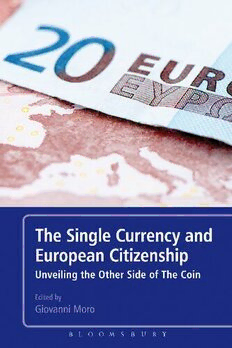
The Single Currency and European Citizenship: Unveiling the Other Side of The Coin PDF
273 Pages·2013·4.726 MB·English
Most books are stored in the elastic cloud where traffic is expensive. For this reason, we have a limit on daily download.
Preview The Single Currency and European Citizenship: Unveiling the Other Side of The Coin
Description:
Established in 2002, the Euro is now the currency of 17 countries used by over 335 million people daily. Although the single currency is much discussed in terms of macroeconomics and global finances, policymakers rarely address its impact on European citizenship in social, cultural, political, and everyday life economics terms. This hidden side of the single currency is the focus of the essays, which use various approaches, from economic history and political sociology to citizenship and legitimacy, to reveal the connections between the Euro and European citizenship.This timely contribution by renowned experts provides a greater understanding of the Euro at a time when it is not clear whether it should be celebrated or commemorated, and looks into aspects of the single currency that are the base of the social trust that supports it and that is at stake in the present crisis. It will be an essential tool to anyone studying the political, social, and economic development of the E.U.
See more
The list of books you might like
Most books are stored in the elastic cloud where traffic is expensive. For this reason, we have a limit on daily download.
